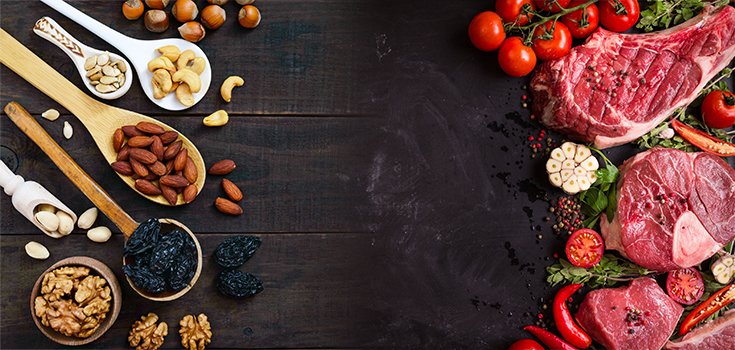Proteins from Nuts, Seeds Are Heart-Healthy (But Proteins from Meat Are Not)

Researchers in California and France want to remind us that not all protein is created equal (at least when considering the nutrition of the entire protein-filled food). They say that meat protein is associated with a significantly increased risk of heart disease, while proteins from nuts and seeds are heart-healthy. [1]
Published in the International Journal of Epidemiology, the study found that people who eat large quantities of meat protein had a 60% risk increase in cardiovascular disease (CVD). By comparison, people who consumed large amounts of protein from nuts and seeds experienced a 40% reduction in CVD risk.
Gary Fraser, MB ChB, PhD, from Loma Linda University, and François Mariotti, PhD, from AgroParisTech and the Institut National de la Recherche Agronomique, said:
“While dietary fats are part of the story in affecting risk of cardiovascular disease, proteins may have important and largely overlooked independent effects on risk.”
Fraser said that he and his colleagues have long suspected that red meat increases the risk of CVD, while adding more nuts and seeds to your diet protects against it. [2]
The researcher hopes that the findings will lead to further research into the way certain amino acids found in animal proteins boost the risk of heart disease, as well as more research into the relevance of blood pressure, blood lipids, and weight.
Additionally, the study found that eating more refined grains, sugary foods and starchy foods like potatoes, may promote poor heart health. These foods tend to dominate many vegetarian diets.
Lead author Dr. Ambika Satija wrote:
“It is apparent that there is a wide variation in the nutritional quality of plant foods, making it crucial to take into consideration the quality of foods in a plant-based diet.”
Reducing meat consumption has long been associated with better cardiovascular health. For example, eating animal products has been shown to increase the risk of blood clots that lead to heart attack and stroke. And back in 2013, Harvard researchers wrote that reducing meat consumption could extend your life by up to 20%.
Though one 2016 study found that eating more plant-based foods offsets the dangers of eating meat. Cool, right?
Sources:
[1] Science Daily
[2] Independent

Plant proteins have solid one health advantage and that’s the fact that they don’t tend to raise insulin levels as much as animal proteins. Protein doesn’t raise insulin as much as carbs but it does to some extent (afaik, around 40% on average compared to carbs) and now that we know insulin resistance poses grave health risks and is prevalent in an estimated 70 to 80 percent of American adults, this factoid is worth noting. HOWEVER, this article as Joan C also points out, doesn’t distinguish between organic grass fed free range animals who we know have high levels of omega 3 fats and are generally much healthier than CAFO animals. It also doesn’t provide context of meat combined with low quality oils, processed foods, or a high carb diet all of which potentiate the bad health effects of CAFO products.